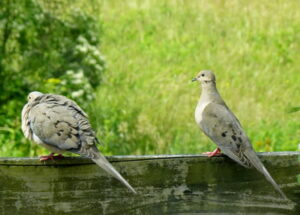 He stands on a wood fence near my back porch, fluffing his feathers and waving his head side to side. He struts back and forth keeping an eye on his Lady Love who watches his every move.
He stands on a wood fence near my back porch, fluffing his feathers and waving his head side to side. He struts back and forth keeping an eye on his Lady Love who watches his every move.
Soon he goes for the big persuasion. He stands close, puffed and fluffed, and bows under her head to offer food like a supplicant. She takes the offering. “Yes.” Within a few seconds he jumps on her back. The consummation of their sweet affection takes one or at most two seconds and then they fly away together across the field with that unique rhythmic wing whistle doves make when they fly.
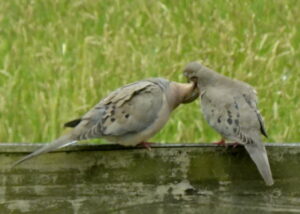 The next day, they return and repeat the routine. He fluffs and puffs and she eats his offering and allows him to gently jump on her before they fly away. That afternoon, I see them carrying sticks around the yard, especially near the garage, so maybe they’ll nest on the garage light or in the spruce trees.
The next day, they return and repeat the routine. He fluffs and puffs and she eats his offering and allows him to gently jump on her before they fly away. That afternoon, I see them carrying sticks around the yard, especially near the garage, so maybe they’ll nest on the garage light or in the spruce trees.
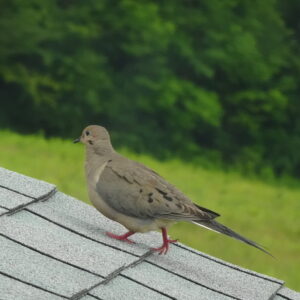 The third morning, I open my bedroom shade and there they are walking on the roof. He carries sticks and she piles what he brings in the bottom of the rain gutter. When it’s high enough to suit her, she makes another messy stick pile on top.
The third morning, I open my bedroom shade and there they are walking on the roof. He carries sticks and she piles what he brings in the bottom of the rain gutter. When it’s high enough to suit her, she makes another messy stick pile on top.
Her twigs are at the blocked end of the gutter, so rainwater flows nearby but around her disorganized home. She has good drainage and a spectacular view looking out over hazy fields. They preen and groom each other’s feathers with a gentle cooing song.
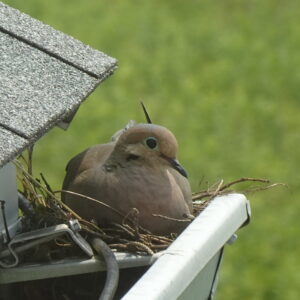 I open my bedroom window for a little heart-to-heart talk. “You can’t nest there,” I tell them in a stern voice. “Your nest might get washed away in a heavy rain.” They hardly glance at me. Apparently I pose no threat and they’re not interested in my advice. Her decision has been made.
I open my bedroom window for a little heart-to-heart talk. “You can’t nest there,” I tell them in a stern voice. “Your nest might get washed away in a heavy rain.” They hardly glance at me. Apparently I pose no threat and they’re not interested in my advice. Her decision has been made.
Every morning, he’s on the nest. Mourning Dove males do half the incubation, usually the morning to mid afternoon shift. She returns by late afternoon and incubates until the following morning. They never leave the nest untended. What a guy! He feeds his lady, helps build the nest, incubates eggs, and watches over his family. When the eggs hatch, he’ll produce “crop milk” or “pigeon milk” in his esophagus and help feed the kids.
As I watch him help build the nest and provide food, I see why doves are sacred to Aphrodite. They’re lovers and gentle creatures, graceful protectors of peace. They even get along with bossy Blue Jays. When I look out my bedroom window, night or day, one of them is always on the nest, watching, curious, relaxed, and unafraid.
***
For the first time since 2017, I haven’t found Monarch butterflies on my land. I’m disappointed and haven’t completely given up hope for late arrivals, but their absence encouraged me to look for beauty in new places. I’ve never had doves nest where I can watch them court, build, and feed their chicks, so I read about them and learn how they feed their two chicks “pigeon milk” or partly digested seeds from their crop. I already see they’re attentive partners and lovers, fitting for birds sacred to Aphrodite.
For other posts about a goddess, see Ma’at: Egyptian Goddess of Truth, Justice, & Heart. For another post about birds who live on my land, see The Tree Swallow’s Sacred Nest.
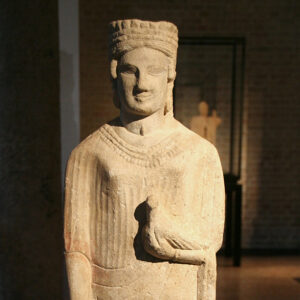
Dear Elaine,
Thank you so much for encouraging us to look for beauty in new places too! For me, doves represent the pure, spiritual aspect of love, rather than physical love. And they’ve always felt like divine ‘visitors’ to this world. I think it’s because they always ‘return home’ (to their mates) making them innately romantic, and for that reason alone, all the more appealing!
And now I think to myself, ah, the Monarchs haven’t come ‘home’ but Aphrodite and her doves (lovers) have! Why mention this, well, if I could send a message from beyond, I too might send a pair of doves to my love. It’s wonderful they’ve chosen that exact spot, above your bedroom window, to nest. Oh, I love tuning into your nature channel! Deep gratitude.
Love and light, Deborah
Dear Deborah,
For the last two days, the Mourning Doves sat on their stick nest with water from the roof dripping on their heads. I saw Mama stand up on the edge of the rain gutter for a minute yesterday afternoon and wondered what she would do. She gave her feathers a few good shakes and got back on her nest. No rain today and incubation goes on. Did they mind rain on their heads? I have no idea, but I saw their dedication to the eggs and the task of incubation. I probably won’t see the babies until they’re hatched and then I hope to see the parents feed two nestlings.
After spending two years studying Eros and Psyche, I also know another side of Aphrodite–jealous and cruel as she assigns impossible tasks to Psyche to prevent Eros from falling in love. That widened my view of Aphrodite and I see her as an Initiator in some cases as well as a devoted Goddess of Divine Love. It was too complicatefd to include this aspect of the Goddess in a short blog, so I kept it simple and focused on those gorgeous love birds presented by Nature. I also didn’t write about the doves pulling Aphrodite’s chariot, so maybe I have more Aphrodite stories to tell. I wish my Nature Channel could tune into the Monarch’s mysterious location, but so far I don’t see any Monarchs, eggs, or caterpillars and none of the Monarchs sites have articles about it. The eggs my friend brought didn’t hatch, so they probably weren’t fertilized.
The oaks are beautiful, the streams are full, and air quality is much better. I hope Nature is benevolent in your world today and your garden can handle the heat.
Like Deborah, I enjoy tuning into your nature channel. Your vivid description of the collaboration and mating of the doves who made a stick nest close to your bedroom invites me to pay attention to what’s going on outside my window too.
I’ve moved my hummingbird feeder and potted flower closer to where I’ve seen them flutter, so I’ll hope for a re-appearance just as I hope for monarchs as a happy surprise for you. Oh, please!
Doves have a spiritual meaning to me too; the indwelling Holy Spirit is often symbolized as a dove. I remember a song we sang from the Mennonite Hymnal when I was a child: https://www.youtube.com/watch?v=id9yPwhW9JU&ab_channel=SESamonte
Before going to sleep last night, I filled the hummingbird feeder, so the hummers being cared for from FL to NY (and inbetween). My feeder is out a window above my desk so every they come for a sip, I see them. I could have gone many wonderful ways with the Dove image, certainly to the indwelling Holy Spirit. To keep the blog short, I focused on the behavior I see each day. They’re the most gentle of birds and are symbolically important in many religions. After spending time with them, I feel the power of their calm nonaggressive nature. Wishing you well in every way.
You made a good choice of topic, Elaine. People these days would do well to develop more “dove-like” traits than hawkish ones.
I fully agree, Marian. We need dove behavior in this world.
Thank you as always Elaine for these beautiful stories honoring the power of nature
Thanks Gita. Yesterday I found 6 bluebird eggs in a nest down the hill. I still haven’t seen Monarchs, but haven’t given up looking for them or their eggs.
Thank you for sharing your mindful witnessing of the delightful courtship of beautiful doves. It t brought me to a moment of appreciative joyful for you & your gift with words.
Thank you, Patricia. I’ve seen Mourning Doves around my home and near the birdfeeders for years, but have never had a couple move in as neighbors. I love opening my shades in the morning and watching them watching me. No nestlings hatched so far, but that should be coming soon. Each close interaction with birds or butterflies feels like a gift because the Monarchs and the intense smoke pollution from Canadian fires (the air quality is better today) teach me not to count on things I took for granted.
We have been gifted with a nest in what used to be a flower box. It is now the home of two little feisty and loud Carolina wrens. I can’t tell the difference between the male and female yet, so will have of find that out. But one of them is always on the nest and the one on the wing always returns with a spider or worm. It screeches loud notices to its partner, and any potential invaders, and waits for the answering cheeps from the nest. Once they are heard, it hops onto the edge of the flower box to look around a little more before entering with its treasure. What fun they are to watch. The eggs were laid the second day of our arrival here, so we might get to see the fledging of the little ones.
I’ve just searched Google to see if wrens are associated with any gods or goddesses, and Bingo! “The Celts called their sacred Eurasian Wren “Drui”, (meaning “The Druid among Birds”). Under the protection of Taranis, the Celtic God of Thunder, Wren often nested in his oaks. Killing a Wren brought the wrath of the Gods upon unwary people.”
Well, how cool is that? Thanks for your lovely story and the inspiration to explore the details of mine.
Much love, Jeanie
How cool is that! I don’t have Carolina Wrens, but their cousins House Wrens. They stuff an available nesting box with sticks so other birds can’t use it, so I monitor nests and remove their competitive strategy. Occasionally there are eggs in that nest, so I leave it alone, but usually it’s just a nesting box crammed with sticks. To dissuade House Sparrows from destroying six new and oh so beautiful bluebird eggs, I made a sparrow spooker which is just a shiny piece of ribbon fluttering in the wind. The Bluebirds don’t mind, but the Sparrows stay away–theoretically.
I enjoy your research about Wrens and wonder what it might mean for you to have one as a neighbor. I’m still grieving for the Monarchs who usually arrive in early June but still aren’t here. There are few large butterflies of any type. My Doves are still patiently waiting in their gutter nest of sticks 24 hours a day. There may be nestlings in there, but I can’t see them unless I climb out to the edge of the roof. I’ll skip the climbing adventure and wait for the nestlings heads to pop up for food. Enjoy your Carolina adventures. Love, Elaine
you wrote a beautiful love story, dear Elaine. You have a wonderful and extraordinary view towards Mother Nature. The Monarch may have a break as long as you keep your precious mind and watch it. Blessing.
I’m writing this at work because I was afraid not to be able to read it on the weekend. ❤️
Thank you, Aladin. The Mourning Doves (or Love Birds) are still on their nest and it’s a privilege to watch their devotion to each other and their pile of sticks. I planned to complete my Monarch book this summer, but it’s hard to find the awe and wonder when I’m disappointed by their absence. They’ve been my summer joy for many years. It’s possible they’ll still come late, but meanwhile I’ll enjoy Doves and Bluebirds and whoever else shows up. Have a wonderful weekend filled with peace and rest.
Dove=love – such a lovely observation Elaine thank you. Beauty is all around to be seen. Here’s hoping the Monarchs arrive soon.
I hope the Monarchs arrive, too, but there’s not much I can do except hope and wait. My morning hikes include searching for signs of butterflies or caterpillars or Monarch eggs as the milkweed plants flower and fill the morning air with sweet perfume. The Love-Doves are doing fine. This morning the female was on the nest when I woke up and an hour later, I saw her mate on the barn roof, so he took over on the nest for the day. They’re an ancient symbol of love, peace, and devotion in Jewish Mysticism, Christianity, Islam, Sumeria, Greek mythology, and much more. I love the images of Doves pulling Aphrodite’s chariot through the sky, but couldn’t find any available for public use. I hope all is well in your world.
Dear Elaine, I am saddened to hear that the Monarchs have not (yet) arrived, though I love that you can turn your channel to the magic and mystery of the Love-Doves. I read that the incubation time is about 14 days, so you may have babies by now!
We are still mourning the fact that this is the first year the barn swallows have not returned, but we have had more black bears than ever with the abundance of cherries this year. In particular, a huge cinnamon colored bear seems to be hanging out in a different cherry tree every day. Lots of crashing and broken branches and huge piles of scat loaded with cherry pits!
Sending love and summer blessings, Anne
The Monarchs arrived a few days ago with an orgy of mating near a field of milkweed. They’re a month later than usual, but I’m glad some are here and when it’s not so wet, I’ll go searching for eggs. The Dove family is still in my rain gutter. The parents regurgitate predigested mush from their crops, so I don’t see the coming and going of feeding the babies and haven’t seen the little ones. I’m sure they’re under warm protective wings and I’ll see them when they emerge from their stick pile. I imagine a large bear could do some big damage, but also be a joy to watch, but the price is no cherries for the humans and broken tree branches. (I used the poem quote your sent about faith in this week’s blog about a new nest of bluebirds. Thank you.)